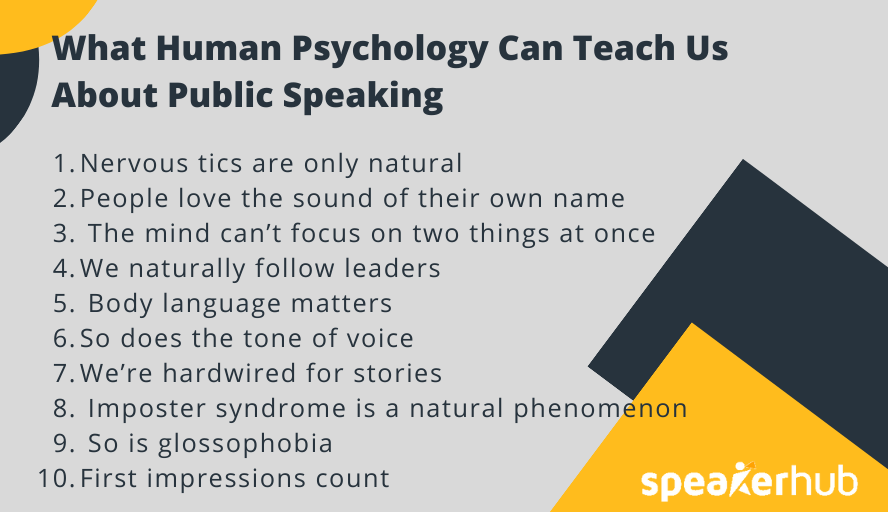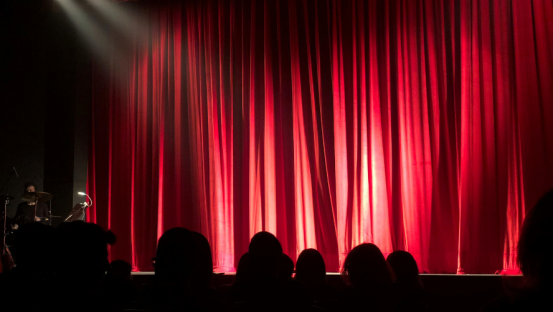What Human Psychology Can Teach Us About Public Speaking

Psychology is a fascinating field, and it’s one that’s constantly evolving as we learn more and more about the way that human beings act and think. It’s also relevant to a surprisingly wide variety of disciplines.
For example, marketers tap into psychology to increase the odds of people buying their products, while police forces use psychology to understand criminals and to figure out whether someone is lying or being deceitful.
So with all that in mind, we thought it would be interesting to take a closer look at what psychology can teach us about our favorite field. Let’s dive in and take a look at the lessons that are on offer.

1. Nervous tics are only natural
If you’ve ever been nervous before giving a talk (and haven’t we all?), you’ve probably noticed that you started to shake or that you had a huge amount of nervous energy. That’s only natural and is a result of the rush of adrenaline that we get before we take to the stage. Public speakers need to remember this and to take steps to combat it, avoiding the temptation to speak too fast or to wander all over the stage while talking.
2. People love the sound of their own name
How to Win Friends and Influence People author Dale Carnegie famously said, “Names are the sweetest and most important sound in any language.” In fact, he believed that names are so important that he advised people to make a point of remembering people’s names and using them in conversation. This is impractical when you’re addressing an entire room, but it’s a good idea both for networking and for when it comes to answering questions or moderating a panel.
3. The mind can’t focus on two things at once
Writing for Psychology Today, Beverly D. Flaxington explains, “The mind can’t focus on two things at once.” In practical terms, that means that we need to make sure that our presentations are free from distractions and that everything we say and do is helping to communicate our message. If we ask people to focus on two or more things at once, we’re setting ourselves up for failure from the outset.
4. We naturally follow leaders
As human beings, we naturally follow leaders. We always have done and we always will do, from our primitive days as hunter-gatherers to the 21st century and beyond. The good news is that when you’re speaking to an audience, you’re automatically positioned as a leader by virtue of your place on the stage. The audience wants you to lead them. Don’t let them down!
5. Body language matters
We all know that body language is important, but we don’t always appreciate just how important it is. The way that we hold ourselves can have a tangible impact on the world around us, as well as our perceptions of it, and people’s perceptions of us. One 2009 study found that when people assume a posture of confidence, it naturally makes them feel more confident. And so in other words, if you want to feel confident, you need to fake it until you make it.
6. So does the tone of voice
The way that we say things can be just as important (if not more so) than the words that we use. As public speakers, we spend a lot of time focusing on our body language, but if we’re not spending as much time thinking about how we speak, we’re doing ourselves a disservice. One of the best ways to monitor and improve our tone of voice is to record ourselves talking and then listen back with our eyes closed.
7. We’re hardwired for stories
The human brain is literally hardwired for us to tell and listen to stories, which is good news for us as public speakers. It means that we can find a shortcut to our audience by telling stories that get our point across, which is why it’s so common to see big name speakers using stories as part of their presentations.
8. Imposter syndrome is a natural phenomenon
We’ve all heard of imposter syndrome, but what not everyone realizes is that there’s a psychological reason for why it happens. Almost all of us will fall victim to imposter syndrome at some point, and so it really comes down to how we react to and deal with it. One of the best ways to get through a bout of imposter syndrome is to remind yourself that it’s a natural phenomenon that happens to all of us.
9. So is glossophobia
Glossophobia is the name for the fear of public speaking, and it’s important for us to remember that psychologically speaking, it’s a natural phenomenon, just like imposter syndrome. In fact, it’s the most common phobia in the world, ahead of even the fears of death, heights and spiders. Understanding that glossophobia affects the majority of people can make us feel more comfortable with public speaking because we know that most of the people speaking alongside us are dealing with it, too.
10. First impressions count
We all know that first impressions are super important, which is why we put such an emphasis on it when we go to job interviews or pitch to potential clients. The same thing happens with public speaking, with most audience members deciding whether they trust a speaker or not before they even open their mouth. Focusing on making a good first impression is one of the best ways there is for making sure that people pay attention to what we’re talking about.
Conclusion
Now that you know a little more about what the field of psychology can teach us about public speaking, it’s over to you so that you can share your thoughts and we can keep the discussion going.
What do you think of the information that we’ve shared, and is there anything that you’d like to add? And will you be taking what you’ve learned today and applying it to your public speaking?
As always, be sure to let us know in the comments, and feel free to follow us on your favorite social networking sites for more. We’ll see you soon for another article!





